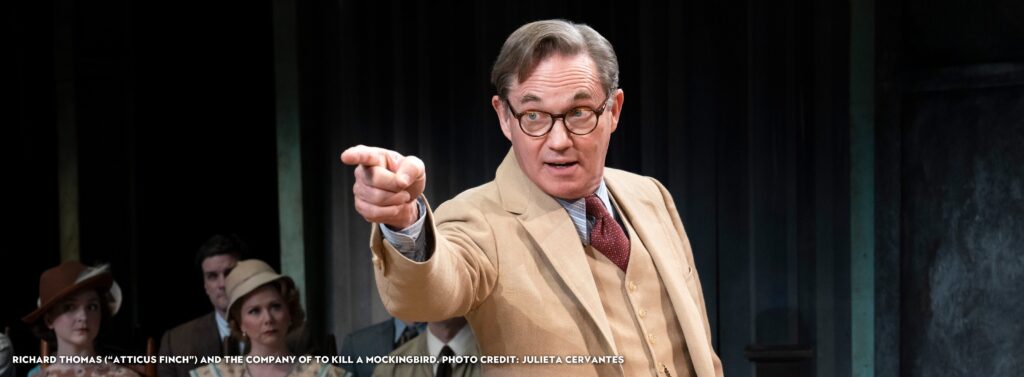By Kimberly Rau

Raise your hand if you read “To Kill a Mockingbird” at some point (probably in school) during your formative years. Harper Lee’s coming of age novel has been required reading for many, the subject of bans and challenges, and, always, a compelling tale about racism, growing up in the south and learning that justice isn’t always fair. Set in the 1930s, it’s a narrative that still holds relevance nearly a hundred years later.
The first national tour of Aaron Sorkin’s version of the story, at the Providence Performing Arts Center through Sunday, is no less poignant, though there are some ways it diverges from the novel.
Our narrator is Scout Finch, supported by her brother, Jem, and friend Dill. Scout and Jem are being raised by their mild-mannered father, Atticus Finch, a lawyer who would rather see the good in everyone than raise his voice to anyone, and Calpurnia, the Black housekeeper who has been with the family for generations. Atticus has been called to defend Tom Robinson, a Black man accused of raping a white woman. There’s no evidence Robinson did such a thing, but a flimsy story concocted by the woman and her trashy, abusive father, has him on the stand, with Atticus fighting for his life.
That trial plays out exactly as it does in the book, down to the ending you see coming but wish with all your heart would somehow be different. But Sorkin, a playwright who also wrote “The West Wing” and “A Few Good Men,” also takes the opportunity to put Atticus under a microscope.
Even in the novel, Atticus Finch, for all his altruism, has a streak of white saviorism that merits examination, and Sorkin makes sure it gets addressed. Calpurnia’s role in the story is enhanced to call out Atticus for his more problematic behavior. At one point, Jem ruins a prized camellia bush belonging to a woman who verbally attacked Jem and Scout, degrading their family and shouting horribly racist things about the trial. Atticus forces Jem to go apologize, shaming him for taking his frustrations out on a “sick, old woman” who still deserves respect. It’s Calpurnia who in turn shames Atticus, reminding him the woman was a nasty piece of work long before she got sick. She further states that offering respect to someone when it disrespects a bunch of other people isn’t anything to pat yourself on the back for. This is done in a way that matches the tone and trajectory of the original story, so it doesn’t feel performative or shoehorned in.
The cast itself is incredible. Emmy Award winner Richard Thomas plays Atticus. Celebrity casting can be a gamble, and here, it’s a win. Thomas is the perfect embodiment of Finch, starting with a quiet intellectualism peppered with a streak of mischievous wit that is most prominent when dealing with his children. It also comes out occasionally in court, to the delight of the audience. Thomas creates a character so believable that when Atticus does finally lose his temper, it feels organic, as does his remorse afterward.
The three children are played by adults, but you forget that almost immediately. Scout Backus, Justin Mark and Steven Lee Johnson play Scout, Jem and Dill, respectively, and the three of them are fantastic on their own, and even better as a group. Backus captures the soul of a young girl who still venerates her father, all the while trying to understand the world. As Jem, Mark has the difficult task of representing a boy who has already started to become jaded, but desperately wants to retain some of his childhood innocence. Both actors give remarkable performances. Dill’s role has also been enhanced from the novel, providing him a more elaborate back story and more of a personality. He also serves as the comic relief when things get too heavy, and Johnson’s character choices couldn’t be better.
Jacqueline Williams is Calpurnia, a woman who manages to hold her tongue until she can’t anymore. Calpurnia doesn’t have many lines until later in the second act, but that doesn’t stop Williams from expertly letting us know exactly what her character is feeling. Ted Koch is the monstrously awful Bob Ewell, who doesn’t seem to have a redeeming bone in his body. Villain roles often can be fun to play, but it’s doubtful that’s the case here. Nevertheless, Koch is excellent in the role. Mariah Lee plays Mayella Ewell, the young woman who accuses Robinson. She doesn’t have much of a voice either, but Lee’s physicality gets across all we need to know about Mayella, who has clearly been victimized all her life, just not by Robinson. And Tom Robinson is played to heartbreaking perfection by Yaegel T. Welch.
The show is performed on a simple but beautiful set that will quickly transport you to 1930s Alabama, where you’ll stay until bows. Even if you’re not familiar with the novel or these characters, you’ll find yourself immersed in their world. Some subject matter may not be appropriate for younger audiences, as domestic violence and sexual assault are common themes throughout the trial, but everyone else will likely very much enjoy the story.
“To Kill a Mockingbird” runs through Feb. 11, 2024, at the Providence Performing Arts Center, 220 Weybosset St., Providence. Tickets may be obtained at the box office, online at ppacri.org or by calling 401.421.2787







